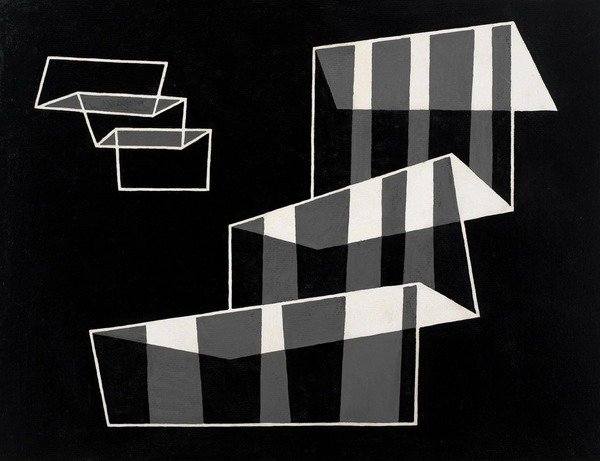Josef Albers
dal 5/5/2014 al 3/6/2014
Segnalato da
5/5/2014
Josef Albers
Waddington Custot Galleries, London
Black and White. The exhibition features almost 50 selected works: paintings, works on paper, glass works, photographs and engravings on vinylite.

‘Black and white was a launching point for infinity in Albers’s work’
– Nicholas Fox Weber, Executive Director of the Josef and Anni Albers Foundation
Waddington Custot Galleries present ‘Josef Albers: Black and White’ in association with the Josef
and Anni Albers Foundation. This is the first exhibition to be held in the UK which explores the
importance of black and white in Josef Albers’s work. Almost 50 selected works testify to Albers’s
versatility as an artist. Featuring paintings, works on paper, glass works, photographs and engravings
on vinylite, this exhibition promises a fascinating insight into his creative journey.
Albers explored the power of black throughout his life. His thorough use of black using multiple
materials helped inform his knowledge and understanding of colour. This self-imposed restriction to
monochrome allowed him to approach the full spectrum with remarkable confidence. It was a similar
approach to that of other great colourists: Georges Seurat restricted his palette to monochrome for
two to three years in the 1880s and Henri Matisse focused on using black around 1918.
Albers’s appreciation of complex tonal contrasts as a draughtsman, printmaker and photographer
would go on to influence his own pupils including Robert Rauschenberg, Cy Twombly and Kenneth
Noland. It also informed his ground-breaking and influential book Interaction of Color, Yale, 1963.
Highlights in the exhibition include an important set of six Treble Clef gouaches from the 1930s,
showing his subtle symbioses of black, white and grey. Six Graphic Tectonic drawings from the 1940s
and Structural Constellations from the 1950s show geometric precision and exemplify his wish to
create ‘maximum effect’ from ‘minimal means’. These complex linear designs offer various possible
spatial interpretations and thereby create optical illusions.
Further works on display include Blick aus Meinem Fenster Stadtlohn, Albers’ earliest extant drawing
from 1911, Steps, one of his Bauhaus glass constructions, and some of his greatest photo collages,
including one of Paul Klee from 1929. Klee was a friend and fellow teacher at the Bauhaus, and these
images were taken before both artists left Germany for the United States. From the 1930s onwards,
Albers visited Mexico on numerous occasions, taking photographs of pre-Columbian sites, including
those of Tenayuca and Uxmal which are featured in the exhibition.
Best known for his iconic series of Homage to the Square paintings, focusing on chromatic interactions,
Albers created these oils, usually on masonite, for a period of over 25 years. Each consists of three or
four squares of solid planes of colour. He often used strong, vibrant colours, but in this exhibition are
eight examples in black and in white. Alongside these will be his Variant or Adobe paintings, their
composition based on the houses in Mexico and the American southwest.
Josef Albers was a pioneering colour theorist and a historic teacher at the Bauhaus, Germany, Black
Mountain College, North Carolina, and Yale University, Connecticut. His impact on contemporary art
and design was and is lasting and profound.
An illustrated catalogue with essay by Nicholas Fox Weber will accompany the exhibition.
Leslie Waddington has held worldwide representation of the Josef Albers Estate for almost 20 years.
Biography
Josef Albers (b. 1888, Bottrop, Germany; d. 1976, Orange, Connecticut, USA) is one of the twentieth
century's most influential artists. Having studied at the Royal Art School, Berlin, Albers continued his
studies at the Bauhaus, Weimar, from 1920. He then taught at the Bauhaus, moving to Dessau when it
relocated there in 1925. The school was closed by the Gestapo in 1933 at which point Albers moved to
the United States, with his Jewish wife Anni, to run art education at the newly founded Black Mountain
College, North Carolina. In 1950 he was appointed head of the Department of Design at Yale University
and in the same year began the Homage to the Square series which was to occupy him until his death
in 1976.
‘The Responsive Eye’ show of Op Art, Museum of Modern Art, New York, 1965, showed his works
alongside those of Victor Vasarely, Bridget Riley and Frank Stella, amongst others. The Metropolitan
Museum of Art, New York, held a solo exhibition of his work in 1971, the first retrospective of a living
artist ever to be held there. In 1988, the Solomon R Guggenheim Museum, New York, organised a
major retrospective of Albers’s work to mark the centenary of his birth.
Recent solo exhibitions include: Centre Pompidou, 2002 and 2012; The Hirshhorn Museum and
Sculpture Garden, Washington DC, 2010; Galleria Civica di Modena, Modena, 2011; The Morgan
Library & Museum, New York, 2012; Galleria Nazionale dell'Umbria, Perugia, and Accademia di Brera,
Milan, 2013.
The Josef and Anni Albers Foundation, formed in 1963, is a non-profit organisation with the aim of
furthering ‘the revelation and evocation of vision through art’. The Josef Albers Museum opened in
Bottrop, Germany, in 1983.
Nicholas Fox Weber
Nicholas Fox Weber is a cultural historian and Executive Director of the Josef and Anni Albers
Foundation. He has written extensively about both Josef and Anni Albers and curated many major
exhibitions and retrospectives dedicated to their work. He is a graduate of Columbia College and Yale
University and author of fourteen books including Josef Albers Works on Paper and Paintings, The
Drawings of Josef Albers, The Woven and Graphic Art of Anni Albers, Balthus: A Biography, Le
Corbusier: A Life, and The Bauhaus Group.
Image: Steps, 1931/1956. ©2014 The Josef and Anni Albers Foundation/Artists Rights Society New York/DACS London
For further press information and enquiries please contact:
Reiber + Partners
Catie van Beuningen
T. +44 (0)20 7436 6082
E. catie@reiberandpartners.com
Waddington Custot Galleries
11 Cork Street, London W1S 3LT
Monday to Friday: 10am - 6pm
Saturdays: 10am - 1:30pm



